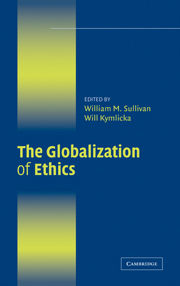Book contents
- Frontmatter
- Contents
- Contributors
- Acknowledgments
- 1 Introduction: The Globalization of Ethics
- 2 Global Ethics and the International Law Tradition
- 3 Morality and Universality in Jewish Thought
- 4 Globalization and Christian Ethics
- 5 Buddhism and the Globalization of Ethics
- 6 Muslim Perspectives on Global Ethics
- 7 Confucianism: Ethical Uniformity and Diversity
- 8 Natural Law, Common Morality, and Particularity
- 9 Liberalism and the Globalization of Ethics
- 10 Feminist Perspectives on a Planetary Ethic
- 11 Ethical Universalism and Particularism: A Comparison of Outlooks
- Appendix: Key Documents on Global Ethics
- Bibliography
- Index
7 - Confucianism: Ethical Uniformity and Diversity
Published online by Cambridge University Press: 03 September 2009
- Frontmatter
- Contents
- Contributors
- Acknowledgments
- 1 Introduction: The Globalization of Ethics
- 2 Global Ethics and the International Law Tradition
- 3 Morality and Universality in Jewish Thought
- 4 Globalization and Christian Ethics
- 5 Buddhism and the Globalization of Ethics
- 6 Muslim Perspectives on Global Ethics
- 7 Confucianism: Ethical Uniformity and Diversity
- 8 Natural Law, Common Morality, and Particularity
- 9 Liberalism and the Globalization of Ethics
- 10 Feminist Perspectives on a Planetary Ethic
- 11 Ethical Universalism and Particularism: A Comparison of Outlooks
- Appendix: Key Documents on Global Ethics
- Bibliography
- Index
Summary
“Confucianism” (a Western term for what the Chinese today simply call the “thought of the scholars”) is a broad, multilayered tradition of thought, full of debates, institutionalized in different ways at different periods of history, and commingled at various times with external traditions, including Buddhism, Daoism, and, recently, even Western philosophies.
Following the contemporary Confucian scholar Tu Wei-ming, we can roughly distinguish three major historical phases of the Confucian tradition: classical Confucianism, which began with Confucius (551–472 bce), became institutionalized as a state ideology in the Han Dynasty and ended with the disintegration of the Han in the third century ce; neo-Confucianism, developed through an integration of Confucian ideas about ethics with Buddhist ideas about cosmology during the Song Dynasty (960–1279 ce) and disseminated throughout East Asia until the end of the nineteenth century; and new Confucianism, an ongoing series of efforts to adapt Confucian ideas to the challenges of modernity in the twentieth century. According to Tu Wei-ming, “The difference between Classical Confucianism and Neo-Confucianism is arguably more pronounced than the difference between Catholicism and Protestantism and, mainly because of the impact of the West, the rupture between Neo-Confucianism and the New Confucianism of the twentieth century is perhaps more radical than that between traditional Christology and the contemporary ‘God is dead’ theology.”
Many Christians would of course deny that “God is dead” theology is Christian at all.
- Type
- Chapter
- Information
- The Globalization of EthicsReligious and Secular Perspectives, pp. 117 - 133Publisher: Cambridge University PressPrint publication year: 2007
- 1
- Cited by

